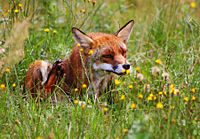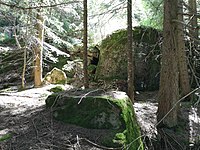Wildness
In western civilization, for example, Darwinism and environmentalism have renewed the perception of humans as part of nature, rather than separate from it.
Wildness is often mentioned in the writings of naturalists, such as John Muir and David Brower, where it is admired for its freshness and otherness.
Modern zoos seek to improve the health and vigour of animals by simulating natural settings, in a move away from stark man-made structures.
As wildness is claimed to be a quality that builds from animals and ecosystems, it often fails to be considered within reductionist theories for nature.
Meanwhile, an ecological perspective sees wildness as "(the degree of) subjection to natural selection pressures", many of which emerge independently from the biosphere.
Thus modern civilization - contrasted with all humanity – can be seen as an 'unnatural' force (lacking wildness) as it strongly insulates its population from many natural selection mechanisms, including interspecific competition such as predation and disease, as well as some intraspecific phenomena.
Human interventions may also upset continued natural selection pressures upon the population, producing a version of domestication within wildlife (Peterson et al. 2005).
Mental health or unhealth cannot be understood in the narrow context of only intrapsychic phenomena or social relations.
Hobbes described the concept in the Latin phrase bellum omnium contra omnes, meaning "the war of all against all."
He affirmed instead that people were born neither good nor bad; men knew neither vice nor virtue since they had almost no dealings with each other.
Another criticism put forth by Karl Marx is his concept of species-being, or the unique potential of humans for dynamic, creative, and cooperative relations between each other.
For Marx and others in his line of critical theory, alienated and abstracted social relations prevent the fulfillment of this potential (see anomie).
He posits that in the natural state we are born wicked and evil because of, for instance, the cry of the baby that demands attention.
— Journal, 22 June 1853 As I came home through the woods with my string of fish, trailing my pole, it being now quite dark, I caught a glimpse of a woodchuck stealing across my path, and felt a strange thrill of savage delight, and was strongly tempted to seize and devour him raw; not that I was hungry then, except for that wildness which he represented.
— "Walking" We need the tonic of wildness — to wade sometimes in marshes where the bittern and the meadow-hen lurk, and hearing the booming of the snipe; to smell the whispering sedge where only some wilder and more solitary fowl builds her nest, and the mink crawls with its belly close o the ground.

